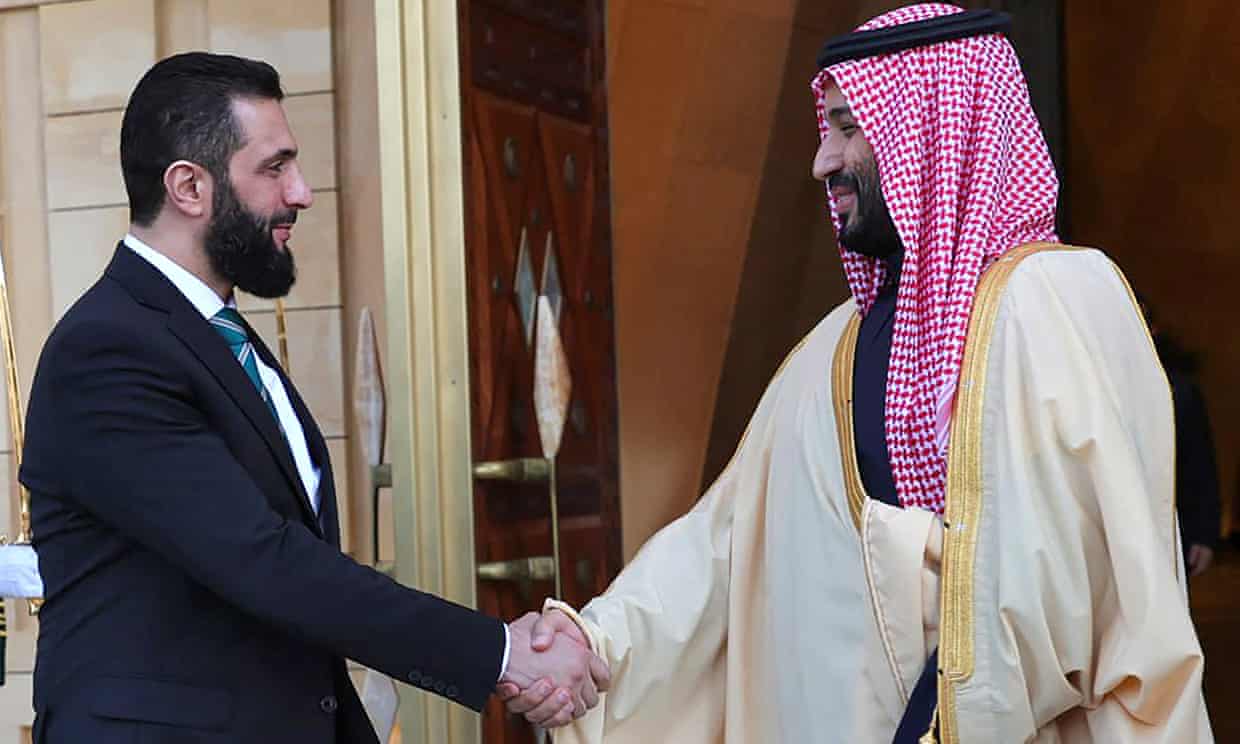Alwaght- Ahmad al-Sharaa, or better known for his nom de guerre Abu Mohammad al-Jolani, who has recently been appointed by an allied military council as president of Syria for transitional period, on Sunday visited Saudi Arabia along with his Foreign Minister Asaad al-Shaibani.
Upong his arrival in Riyadh, al-Sharaa was received by Mohammed Abdel Rahman, the deputy emir of Riyadh region. According a statement released by the Syrian presidency, al-Sharaa met Saudi Crown Prince Mohammed bin Salman.
This comes as a few days ago, both the Saudi King Salman bin Abdulaziz and bin Salman had congratulated al-Sharaa for taking the post and underscored the kingdom's support to the Syrian government and people.
This is al-Jolani's first official visit to a foreign country as president and could be a sign of Hayat Tahrir al-Sham's efforts to garner regional and international legitimacy and attract Arab cooperation by addressing the concerns of major players in the Arab world, such as Saudi Arabia, the UAE, and Egypt.
The head of Hayat Tahrir Al-Sham (HTS) had earlier met with Saudi officials in Damascus. Last week, Saudi Foreign Minister Faisal bin Farhan stressed the need to lift sanctions against Syria during a meeting with new Syrian leader.
Also, a-Shaibani recently visited the Arab kingdom and discussed bilateral relations and regional developments with Saudi officials.
Saudi Arabia has taken a pragmatic approach to dealing with the new Syrian leadership. Although it has shown its willingness to engage, it is cautious about dealing with the new Syrian leaders, given the complicated history of the HTS, an offshoot of Al-Qaeda terrorist group. This caution stems from Saudi Arabia’s history of preventing Islamists, especially the Muslim Brotherhood, from taking the power in the region.
Speaking to Turkish media on January 22, Ahmed al-Sharaa said that his first foreign trip would be to Saudi Arabia or Turkey. “I feel affection for Saudi Arabia,” he said. In this way, al-Jolani gave clear indications about his view of relations between Damascus and Riyadh.
Before toppling of al-Assad government on December 8, Saudi Arabia had resumed diplomatic ties with Damascus after a decade-long hiatus following the devastating civil war. However, their relations did not go beyond political rhetoric and reopening of embassies.
Although Riyadh had twice invited al-Assad to attend Arab summits it hosted, it has not provided much support for the al-Assad government. Therefore, the trip signals a possible shift in regional diplomacy, as well as an attempt by the HTS to adjust its strategy in the face of the shifting political environment in Syria and the region.
Aims and messages of al-Jolani’s Riyadh visit
Although the HTS is recognized as a terrorist group, the trip to Saudi Arabia of its leader has to do specifically with shaping new relations with the Arab countries, with security, politics, and even economy top on agenda.
In this relation, West Asia affairs expert Jaafar Ghanadbashi in an interview with Alwaght commented on goals of al-Jolani's Riyadh visit and why the kingdom is picked as the first destination of the new Syrian ruler. He said: "Al-Jolani's trip to Saudi Arabia was certainly based on the calculation of the existing conditions and with the aim of creating a balance in the policy of establishing relations with the countries of the region. Especially considering the trips of Turkish and Qatari officials to Syria on the heels of al-Assad government's fall and their meetings with him, the suspicion has been strengthened that al-Jolani is not willing to expand relations with Saudi Arabia. Therefore, this trip will provide the opportunity to eliminate Riyadh's possible pessimism regarding the course of developments in Syria. Besides, taking advantage of the dollars donated by the Saudis is something al-Jolani definitely does not want to ignore."
It should be noted that due to war and Western sanctions, Syria is grappling with an economic crisis and so one of the expectations of the new Syrian leadership is that Saudi Arabia and other Arab monarchies lend a helping hand to Syria.
Mr Ghanadbashi added that currently Syria is a confluence of rivaling policies and competing sides known on media as Wahhabi and Muslim Brotherhood factions, each seeking dominance on a larger share from Syrian soil on the strength of their proxy forces. Indeed, odds are that al-Jolani has visited Saudi Arabia with instruction of Turkish and Qatari leaders to ease the misunderstandings between the two sides.
Asked if the HTS can mitigate the Arab concerns about its closeness to the Muslim Brotherhood camp and what would the Arab policy concerning Syria be in the future, Mr Ghanadbashi held that given the chaos and combustible conditions in Syria, not only realizing Arab promises, but also internal political and economic programs looks beyond reach, especially that various armed groups in the country are equipped with different types of arms on the one hand and have considerable experience of using them on the other hand.
So, in the near term, Syria is poised to become a battleground for intense regional rivalries and a stage for settling scores among major global and regional powers. As a result, Arab nations will likely find themselves compelled to continually recalibrate their policies in response to the evolving dynamics on the ground. Meanwhile, with regard to the strains stemming from Israeli crimes and recurrent incursions into the Syria territory by Israeli forces, the ground will be paved for cohesion of anti-Israeli groups, and for this reason the Arab policies will undergo unpredictable upheavals.



























